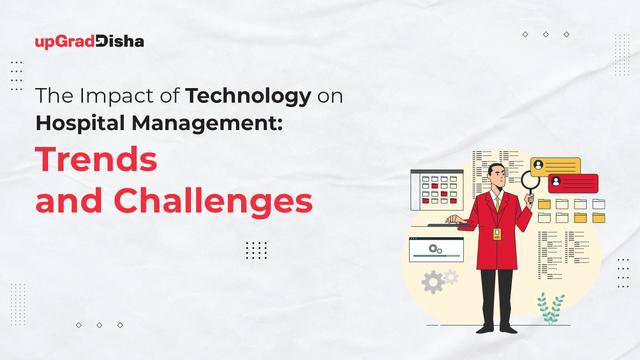The Impact of Technology on Hospital Management: Trends and Challenges
June 5th, 2024: 5 mins
|
This Article Explores:
|
Have you ever wondered how technology is reshaping the hospital management industry? What are the hurdles in embracing this technological evolution? Let’s unravel the intricate intersection of technology and healthcare, navigating through the questions that define the present and future of hospital management in the digital age.
Within the constantly evolving healthcare landscape, the influence of technology has become a dominant force, fundamentally reshaping the way hospitals are administered. As the global healthcare digital market is set to witness a growth amounting to as much as 25.6% CAGR by 2030, we’re at the core of tech innovations, with hospital management undergoing transformational changes.
From improved operational efficiency to increased patient satisfaction, technology in healthcare administration has brought in a plethora of benefits. However, similar to the two sides of a coin, this integration of technology into hospital management has also led to an array of challenges.
Allow us to navigate the transformative impact of technology on healthcare, unraveling key trends and various challenges that come alongside them.
Top Three HealthCare Technology Trends and Innovations
Let’s take a look at the key technological trends that are currently dominating the healthcare industry.
-
Rise of Telemedicine
Telemedicine has become a game-changer in hospital management, particularly in the wake of global events that emphasized the need for remote healthcare. Virtual consultations, remote monitoring, and telehealth platforms can now connect patients with healthcare providers, thereby reducing the burden on physical facilities and improving accessibility to medical services.
According to a report, in the 2022-2023 year, 29.3% of individuals sought professional expertise for their mental health via telehealth services. |
-
Artificial Intelligence (AI) in Diagnostics and Decision Support
Artificial Intelligence, being one of the leading technologies across domains, is also transforming hospital management by contributing to diagnostic accuracy and decision support. Machine learning algorithms can now analyze medical images, pathological reports, and patient data that further aid healthcare professionals in diagnosis and treatment planning. These AI-driven decision support systems ultimately improve clinical outcomes and reduce the likelihood of manual errors, enabling maximum accuracy and smooth automation for hospital administration.
-
Robotic Process Automation (RPA): Streamlining Administrative Tasks
Hospital management involves a multitude of administrative tasks, some of which tend to be repetitive, and RPA has proved to be effective in streamlining all these operations.
From appointment scheduling to billing and claims processing, robots can handle repetitive, rule-based tasks, freeing up human resources to focus on patient care and more complex decision-making.
Key Challenges In Hospital Technology Adoption
While the benefits of integrating technology in healthcare administration are many, the journey is not without its challenges. Mentioned below are a few examples of such key hospital technology challenges that compelling innovations might bring along with them.
-
Cost Constraints
The financial aspect remains a primary challenge for hospitals aiming to automate administrative processes in healthcare facilities. Investing in state-of-the-art technologies often comes with a heavy price tag. In order to find the perfect balance between budget constraints and the need for innovative solutions, careful financial planning, prioritizing key technologies, and exploring cost-effective solutions are required.
-
Cybersecurity Concerns
As technology becomes substantially integral to healthcare, the need for data privacy and security has become paramount. How can hospitals ensure the security of sensitive patient data in the face of evolving cyber threats?
Overcoming this challenge demands robust cybersecurity measures, continuous monitoring, and a commitment to compliance with data protection regulations.
-
Seamless Billing Process
Another one of the most common hospital technology challenges is billing. Although many hospitals use tech-driven innovations to automate various aspects of this complex process, a few parts still require manual intervention. This can further lead to delays in reimbursements for patients. The best way to deal with this problem is to explore the many available AI-powered solutions that fulfill the dual purpose of automation and predictive analytics.
Conclusion
The impact of technology on healthcare is profound, ushering in an era of enhanced efficiency, improved patient care, and data-driven decision-making. However, acknowledging the accompanying challenges is equally significant. As hospitals embrace these technological trends, they must also navigate the challenges that come alongside them.
The best way to do so? Employing skilled individuals with in-demand, industry-approved skills.
If you’re someone hoping to become a part of healthcare management, an online MBA in Hospital and Healthcare Management offered by D Y Patil University can be an excellent choice for you!
Talk to experts at upGrad Disha to learn everything about this program and more!
